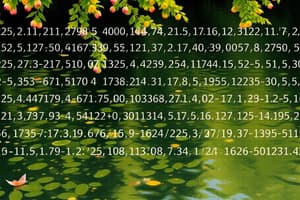Podcast
Questions and Answers
Calculus allows us to model and analyze static quantities over time.
Calculus allows us to model and analyze static quantities over time.
False (B)
Statistics and probability involve making predictions and drawing conclusions from data sets.
Statistics and probability involve making predictions and drawing conclusions from data sets.
True (A)
Geometry does not play a role in solving real-world challenges.
Geometry does not play a role in solving real-world challenges.
False (B)
Mathematics only appeals to those interested in abstract constructs.
Mathematics only appeals to those interested in abstract constructs.
Statistics focuses on testing hypotheses and estimating probabilities.
Statistics focuses on testing hypotheses and estimating probabilities.
Algebra only involves performing arithmetic operations on numbers.
Algebra only involves performing arithmetic operations on numbers.
Calculus is mainly used in predicting population growth and designing aerodynamic aircraft.
Calculus is mainly used in predicting population growth and designing aerodynamic aircraft.
Geometry is solely focused on arithmetic operations and calculations.
Geometry is solely focused on arithmetic operations and calculations.
Calculus is not influenced by algebraic techniques.
Calculus is not influenced by algebraic techniques.
Fundamental operations in mathematics include addition, subtraction, multiplication, and division.
Fundamental operations in mathematics include addition, subtraction, multiplication, and division.
Geometry is only concerned with two-dimensional shapes.
Geometry is only concerned with two-dimensional shapes.
Mathematics is limited to arithmetic and algebra and does not involve other branches.
Mathematics is limited to arithmetic and algebra and does not involve other branches.
Study Notes
Exploring Mathematics: A Fascinating World of Numbers and Patterns
Mathematics is much more than just arithmetic and algebra; it's a vast field encompassing many branches, all built upon the universal concepts of numbers and patterns. In this exploration of mathematics, we delve into its foundations, discoveries, and how these ideas shape our world.
Elementary Mathematics
The building blocks of math can be traced back to fundamental operations like addition, subtraction, multiplication, and division. These skills allow us to perform calculations with whole numbers, fractions, decimals, integers, and even negative numbers. Concepts such as place value, order of operations, and the properties of mathematical operations deepen our understanding beyond basic arithmetic.
Algebra
Algebra introduces variables and allows us to manipulate expressions using equations. Through solving problems involving unknown values, students further their problem-solving abilities while also developing a stronger conceptual foundation for future studies. Algebraic techniques extend well beyond high school, forming the basis for disciplines from calculus to advanced programming.
Geometry
Geometry explores shapes, sizes, and spatial relationships through Euclidean geometry based on rigorous axioms, which underpin many modern technologies such as GPS systems and computer graphics. Students learn to reason logically about geometric concepts, including congruence, similarity, area, volume, coordinates, transformations, and proof writing—all essential tools for visualizing complex structures and solving real-world challenges.
Calculus
Calculus opens up new worlds by allowing us to model and analyze changing quantities and rates of change over time. This powerful tool enables scientists and engineers to solve problems ranging from predicting population growth to designing aerodynamic aircraft. In essence, calculus provides a framework for describing continuous changes in the natural and physical universe.
Statistics & Probability
Statistics and probability involve extracting insights, making predictions, and drawing conclusions from data sets. Statistical methods help researchers test hypotheses, estimate probabilities, and make informed decisions, while probability theory deals with chance events and random processes. Applications span a wide range of domains, from weather forecasting to finance, market analysis, and scientific experimentation.
Throughout history, mathematicians have pushed the boundaries of knowledge, revealing connections between disparate areas of study and uncovering profound truths hidden within abstract constructs. Mathematics inspires curiosity, fosters creativity, and encourages critical thinking, providing valuable life skills applicable across various domains of human endeavor.
Studying That Suits You
Use AI to generate personalized quizzes and flashcards to suit your learning preferences.
Description
Delve into the vast field of mathematics, from elementary operations to advanced concepts like calculus and statistics. Explore how numbers and patterns shape our world, empowering problem-solving and critical thinking skills.




